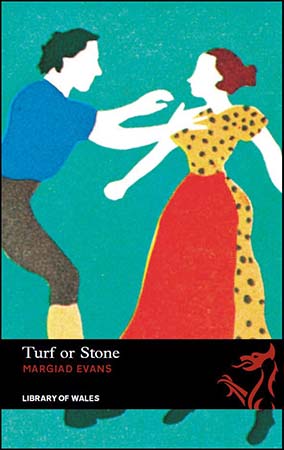
On one hand there is the happy marriage, shot through with love and on the other there is the marriage of Mary Bicknor and Easter Probert, the protagonists, and often the antagonists of Margiad Evans’ dark, troubling and troublingly dark novel, first published in 1934.Evans, the pen name of Peggy Eileen Whistler, once again conjures up a border land which is full of torn allegiances and incessant strife, with misery thick as mud in places.
At the start of the novel Mary Bicknor is a servant-cum-companion to an eccentric lady, but her pregnancy by Probert sees that relationship terminated, and she starts a new life as the wife of the sullen, brutish and sadistic Easter Probert, who is, according to critic Katie Gramich ‘as if Peter Quint, the predatory ghost in Henry James’ The Turn of the Screw, had been reincarnated in a Welsh Border setting.’ ‘Loveless’ doesn’t even begin to describe the cold core of their marriage: ‘glacial’ comes closer to describing a relationship in which the husband takes pleasure in hurting and humiliating his wife.Little wonder, then, that her thoughts turn to suicide, and other means of escaping the pain.And his brutishness is often overwhelming such as the time when Mary is in her fifth month of pregnancy and Easter puts a dead rat in her bed:
And he pushed it deeper and deeper into her flesh, till, hanging round his neck, she dragged herself up, and with the poisonous little carcass crushed between them, seized him by the ear and tugged.They struggled furiously in the darkness.He did not strike her; he half carried, half dragged her across the room and poured a jug of water over her head. She relaxed, one mighty quake shook her and she burst into shuddering groans. She fell prone on the floor, her wet hair over his feet.When he bent to lift her she crawled away from him and hit her head against the wall. She cried like a thrashed animal in snarling despair.
Even though their terrible tale is the fulcrum to the novel, Turf or Stone also turns around the fate and fortunes of the Kilminster family, who employ Easter – with his sullen face and triangular scar just below the eye – as a groom.He has a strange and perplexing hold on them, who recognize his danger and deal with his insolence yet still they keep him on.It may be because he has his uses – he’ll drown a cat without the least prick of conscience, he does his chores without a word.
Despite his new marriage Easter still goes philandering, yet, one night, when he returns to the marital bed, Mary asks him to let one of his mongrel dogs into the house, and onto the bed, maintaining it will help her sleep…
Easter flung it on the bed. Hot and panting, it stretched out its ugly body and fell asleep. Mary lay back gently screwing the almost hairless chilly ears between her fingers.
Easter was swamped by voluptuous tenderness.He clasped her in his arms, softly moving his head between her breasts, his eyes closed.A gentle, timid woman he might have loved with real intensity, and perhaps even constancy, since his promiscuous rovings were something in the nature of a search.
That twisted, unexpected psychology, that ‘voluptuous tenderness,’ that sense of search or quest on the part of a bitter man, is one of the strengths of this novel.I’d dispute the description – in the book’s introduction – of Margiad Evans as a ‘consummate nature writer’ as her characters (and thus the author) pay very little real attention to the world around them, other than for the essentials of animal husbandry and the weather, but she is very good on human nature.Evans strips things down to the bare bones of emotion, makes even the doltish Probert a man of moral complexity, while his relationship to Phoebe, the squire’s intense older daughter is like something out of Hitchcock film.
This is the second volume by Margiad Evans in the Library of Wales series and it’s certainly whetted this reader’s appetite for more of the same.Her writing is dark, that’s for certain, but shot through with truth, too.Evans is a mistress of concision, wielding her sentences pretty much as scalpels, cutting through to the quick.In the red loams of Herefordshire the Uxbridge born Evans found fertile ground for fiction, and staked it out, too, made it her territory, made it her own.










